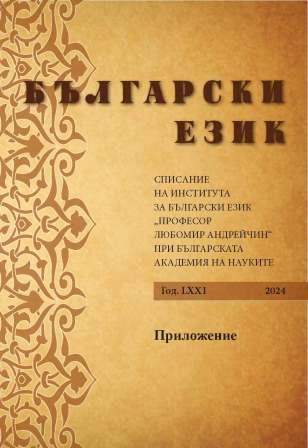Не какъв да е мелодичен контур: влияние на прозодията върху семантиката на неопределителните местоимения от типа който и да е
Not Just Any Melodic Contour: The Influence of Prosody on the Semantics of Indefinite Pronouns of the Type който и да е
Author(s): Denitsa Dimitrova, Laska LaskovaSubject(s): Language studies, Language and Literature Studies, Theoretical Linguistics, Applied Linguistics, Morphology, Semantics, Philology
Published by: Институт за български език „Проф. Любомир Андрейчин“, Българска академия на науките
Keywords: indefinites; prosody; semantics; negation; emphasis; Bulgarian language
Summary/Abstract: This study aims to address a debated question concerning the influence of emphatic stress on the semantics of koyto i da e indefinite pronouns (IPs). The meaning of this class of IPs is often analyzed in comparison to the meaning of the class of koy da e IPs. In contrastive context koyto i da e forms imply absolute randomness in the selection of an element from a given set, while koy da e forms imply selection from a subset of elements of low and medium value. It is assumed that such a contrast is created in negative sentences. Some authors argue that in this type of context IPs from both classes are not interchangeable, while others suggest that placing emphatic stress on koyto i da e aligns its semantics with koy da e. To test this hypothesis, we conducted a survey in which respondents were asked to determine the semantics of nine structurally identical sentences containing koyto i da e indefinite pronouns, differing only in their prosodic contour (emphatic or non-emphatic).The article begins with a review of approaches to modeling the semantics of both types of indefinite pronouns and the role of negation and emphasis. Attention is given to the difference in expressive strength between written and spoken language and its impact. Subsequently, we present the survey, along with the obtained results and their interpretation.
Journal: Български език
- Issue Year: 71/2024
- Issue No: Special
- Page Range: 124-143
- Page Count: 20
- Language: Bulgarian

